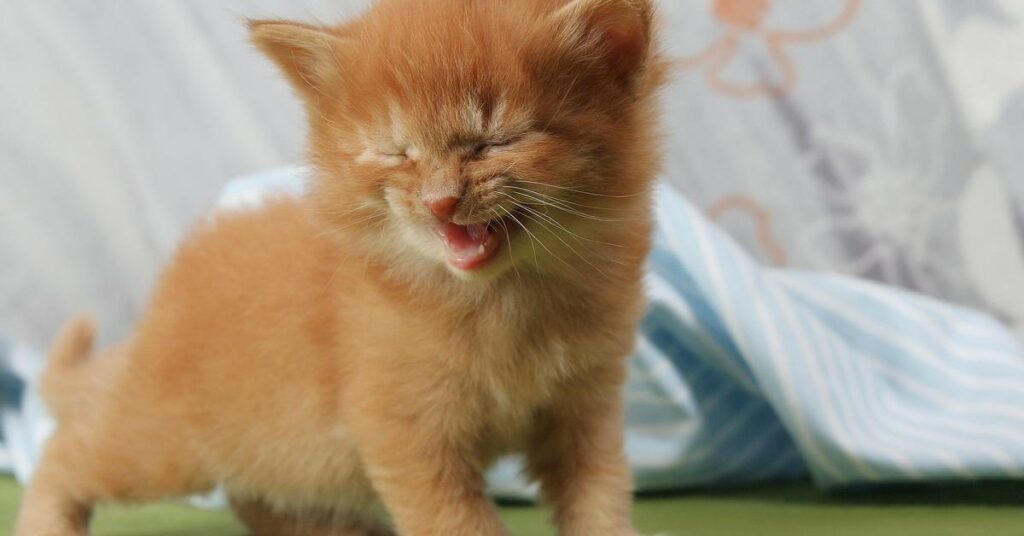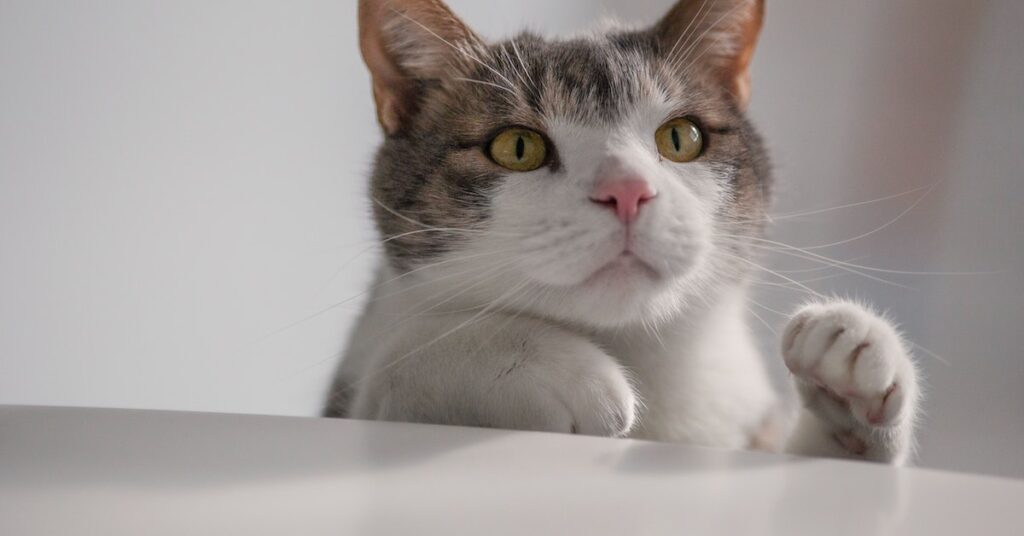There are several different reasons your cat might vomit blood. You’ve probably already looked for gastrointestinal parasites, Intestinal parasites, and Rat poison ingestion. However, your cat may also be having a heat stroke, and we’ll cover those in a minute. For now, let’s focus on why Cat Vomiting Blood? and how to diagnose it. You’ll be glad you did once you know what to do!
Read more about How Often Do You Take a Cat to the Vet?
Inflammatory bowel disease
Inflammation bowel disease, also known as IBD, is a group of digestive system diseases. The disease is characterized by persistent inflammatory signs, usually without a known cause. There are three main types of IBD in felines, based on where it occurs in the body and the type of cells involved. The two most common types are lymphocytic pleocytosis and eosinophilic enteritis.
IBD is a complicated group of diseases that affect the gastrointestinal tract. Crohn’s disease is one well-known variation, but there are several other types of IBD. Cats can develop granulomatous colitis or lymphoplasmacytic gastroenteritis, which can affect the large intestine. Infections with any of these types can cause severe blood in the stool.
To diagnose IBD, your veterinarian will likely perform a comprehensive workup. Some symptoms are common in many feline illnesses, so your vet may order a full blood panel and fecal examinations. He may also perform X-rays and abdominal ultrasounds to rule out other conditions. X-rays and ultrasounds can show the thickness of the intestinal wall, which can help guide treatment. If your veterinarian suspects IBD, he or she may suggest surgery to check for any underlying diseases.
Treatment for this condition may involve several medications. The first is Metronidazole, an antibiotic with anti-inflammatory and anti-protozoal properties. Other medications, such as corticosteroids, can help suppress the immune system. Diet modification may also help to alleviate some symptoms and enhance medical treatment. Other medications include anti-inflammatory drugs and prebiotics to restore the balance of good bacteria in the GI tract. Vitamin B12 and fiber may be prescribed as well.
Treatment for inflammation bowel disease in cats can include dietary changes. Since IBD is not strictly a food allergy, dietary changes are often beneficial. Hypoallergenic diets may help eliminate treats, table foods, and other food items. The diet trial may take several weeks to show positive results. If your cat does not respond to the hypoallergenic diet, a low-fat, high-fiber gastrointestinal diet may be a good option. You may also want to consider giving your cat probiotics.
Read more about Cat Ear Infection Home Remedies
Rat poison ingestion
Your cat may vomit blood after ingesting rat poison. Symptoms may begin to appear four weeks after ingestion. Your cat may vomit blood, become dehydrated, or have abdominal swelling. The signs may be delayed, but you should seek emergency medical care. If your cat has ingested rat poison, the signs may be subtle and difficult to recognize. The signs of rat poison poisoning may include bruising, bloody feces, and urine, nosebleeds, and vomiting. Some pets may even die without any clinical signs.
Symptoms of rat poison poisoning vary based on the type of rat toxin used. Some are anticoagulant based, while others may be based on zinc phosphide or bromethalin. The signs and treatments for each type of rat poison differ slightly. Most do not have antidotes, and symptoms can last for weeks. Your cat should be evaluated by a veterinarian if you suspect it has ingested rat poison.
If your cat vomits blood after ingesting rat poison, the best course of action is to induce vomiting. To induce vomiting, mix a small amount of hydrogen peroxide with water and squirt it down the throat of your pet. Then, stand by and wait fifteen minutes. If your cat does not vomit blood within 15 minutes, contact a veterinarian immediately. If the vomiting and bleeding persists, rat poisoning is an emergency, and treatment is crucial.
In some cases, you may see some symptoms within hours. In others, you may notice a delayed reaction. A symptom of rat poison ingestion may not be evident. If you suspect rat poison ingestion, try to capture the culprit rodent by putting a cage around the area. It’s best to avoid placing rat poison around children and pets. The treatment will depend on the type of poison used.
If your cat vomits blood, it may be an ulcer, or something else. Your veterinarian will diagnose the condition and help you create a treatment plan. However, be careful about conventional rat poisons. The toxic substance is dangerous to humans and animals, and rat poison can still be ingested by cats. If you suspect your cat has ingested rat poison, get to the vet immediately.
Read more about 163 Interesting Facts About Cats That Every Cat Lover Should Know
Intestinal parasites
If your cat is vomiting blood, the problem may be due to intestinal parasites. This condition may cause your cat to become anemic, experience weight loss, and become dehydrated. In some cases, it can even lead to death. There are several ways to treat a cat vomiting blood due to intestinal parasites, including a monthly heartworm preventive and daily hand washing. Keeping your cat’s environment clean and avoiding the cats’ favorite hiding places is essential.
The most common cause of a cat vomiting blood is stress. If your cat is feeling anxious, it may be a sign that your cat is suffering from intestinal parasites. This can cause gastrointestinal inflammation and bleeding, which can lead to severe pain and discomfort in the cat. The infection may even cause a distended abdomen. Regardless of the reason for vomiting, it’s important to consult with your veterinarian for a proper diagnosis. If your cat has an infection, it’s important to treat it immediately to avoid any further complications.
Inflammatory bowel disease is another possible cause of cat vomiting blood. The condition of inflammation in the colon can be short-term or long-term. Most cats that have this condition are middle-aged and purebred. Inflammatory bowel disease often results from a combination of factors, including food allergies and an over-reactive immune system. Symptoms may include dehydration, depression, weight loss, and abdominal pain. Antibiotics can help mitigate the symptoms of inflammatory bowel disease in cats.
Hookworms are an infection caused by larvae that attach to the lining of the intestine and feed on the blood of their hosts. A cat can contract hookworms directly or through larvae that enter the cat’s body through the skin. This infection will cause the cat to vomit blood, and may also lead to skin lesions that resemble snakes. Hookworms and tapeworms are long flat worms that can infect humans. The eggs can be spread to humans through the diet or by inhaling them. Fleas may also contain tapeworm eggs.
Another possible cause of cat vomiting blood is gastrointestinal parasites. If your pet is consuming contaminated food or water, he or she is likely to be exposed to these parasites. It is best to visit your veterinarian if you notice blood in your cat’s vomit. The veterinarian will diagnose the condition and prescribe treatment. Once your cat is diagnosed with intestinal parasites, you should take the necessary steps to make sure it stays healthy.
Read more about Cat Urinary Tract Infection Home Remedies
Heat stroke
A cat vomiting blood because of heatstroke is a serious complication that requires immediate attention. The symptoms of heatstroke can include excessive panting, lethargy, and distress. If not treated quickly, your cat could develop unconsciousness and even death. The condition often occurs in unventilated cars and requires immediate medical attention. Cooling your cat in a cool bowl of water is the first step in treating heatstroke. If you’re transporting your cat in a hot car, cover it with a cool towel. Make sure you contact your veterinarian as soon as possible.
If your cat is vomiting blood because of heatstroke, you should visit the veterinarian immediately. Your vet will be able to tell you what further steps to take if your pet’s temperature drops below normal. Early treatment is the best medicine. Provide fresh water and shade for your pet to stay cool. Try to keep your pet indoors during hot weather, bringing him out only for bathroom breaks. If your pet seems fine, don’t leave it alone – heatstroke symptoms are often subtle.
Your veterinarian can perform tests to determine whether your cat is suffering from heatstroke. The doctor will be able to determine if your cat has suffered internal organ damage and whether it is vomiting blood because of heat stroke. After the blood has drained from its stomach, the veterinarian will assess the condition and prescribe the appropriate treatment. This may include cooling the cat with tepid water or ice. If you can’t reach the veterinarian immediately, you can try a cooling method yourself.
While the heatstroke symptoms in your cat may be mild and non-existent, it can become a more serious issue if untreated. Heatstroke can lead to organ damage, coma, or even death if not treated immediately. It’s important to remember that heatstroke can happen to any animal, regardless of species. If you see your pet suffering from heat stroke, contact your veterinarian immediately. Don’t let it go untreated!
Read more about How to Tell If Your Cat is Healthy








